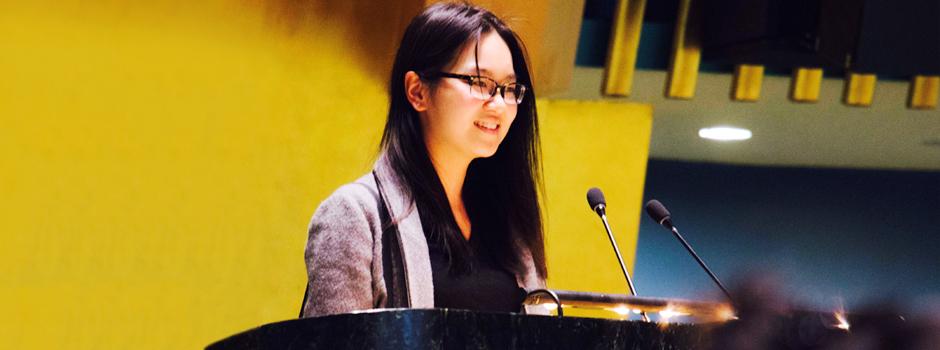Although she has yet to graduate, Jialing Wang ‘17 already knows where she will be starting her career. The business and finance major has been offered a position with ZhenFund, a Beijing-based seed fund that aims to promote innovation among youth in China, and will be working in the company’s new East China office based in Shanghai.
The opportunity to work with ZhenFund first arose as an internship during the summer of her junior year. “I applied to and was offered internships at both PriceWaterhouseCoopers and ZhenFund,” recalls Jialing. She chose ZhenFund for the same reasons that motivated her to apply to NYU Shanghai: "ZhenFund is dedicated to helping entrepreneurs with their startups, and its new East China office can itself be considered a startup,” she says. “This kind of brand-new opportunity to start from scratch always makes me excited.”
In his best-selling book, Facebook investor Peter Thiel describes the process of building a successful startup as getting from ‘zero to one’ -- an expression Jialing Wang ‘17 applies to her NYU Shanghai experience. “I have gone from ‘zero to one’ twice now”, says Jialing, “From being part of the inaugural class of NYU Shanghai and helping build up the university, to interning and then being offered this position with ZhenFund.”
As an intern, Jialing had to assess the investment potential of projects from different industries. "This requires knowing about all the sectors and industries,” she said. “My advice to those who do not have any industry experience is to do as much preparatory work as you can.”
And Jialing has been proactive in following her own advice. Over the course of her four years at NYU Shanghai, she has taken every opportunity to gain a variety of experience.
She has studied abroad in New York and London, been a student ambassador for NYU Shanghai, worked for the university’s career center, volunteered for the Chi Heng Foundation to raise HIV/AIDs awareness, and interned at McKinsey’s Finance Department in Shanghai.
“I was McKinsey’s first intern from NYU Shanghai and I worked very hard to gain recognition from my supervisors,” she said.
But Jialing admits she was not always as outgoing and credits an experience in her freshman year as a turning point. She was one of two students chosen to represent NYU Shanghai at the NYU Global Student Leadership Summit in Abu Dhabi, which saw 35 students from across New York University's portal campuses and global sites come together to explore ways to build community across boundaries.
"When I first arrived at NYU Shanghai, I was hesitant to participate in events, but when I saw what an opportunity this summit could be for me, I gave it my best shot,” she said. “When I was selected, it was then that I became confident that one’s efforts will pay off.”
By her sophomore year, Jialing was ready to embrace a leadership role, organizing NYU Shanghai’s inaugural Sila Connection conference, inviting students from universities across Shanghai to come together and share ideas and solutions to global challenges facing the city.
“This was an experience that really challenged my communication and problem-solving skills,” she says. "With many international students on the team, we all had different perspectives. It’s not about waiting for a solution to magically come to you. We had to be patient with the obstacles that came our way.”
Reflecting on her choice to study at NYU Shanghai, Jialing considers it destiny: “When I was in high school in Ningbo, I saw a news story about the founding of NYU Shanghai. I liked that it only admitted 300 students each year and had a high teacher-to-student ratio, so I applied” she said. “After experiencing Candidate Weekend and seeing just how many excellent students from around the country were eager to be a part of NYU Shanghai, I accepted the offer without hesitation -- I just knew I had to go to this school.”
So how does she feel four years later? “NYU Shanghai has been beyond my expectation,” says Jialing. “At NYU Shanghai, everyone brings their own rich experience and different talents. I realized that one must not use a single standard to judge others but instead learn to appreciate each person’s uniqueness.”



